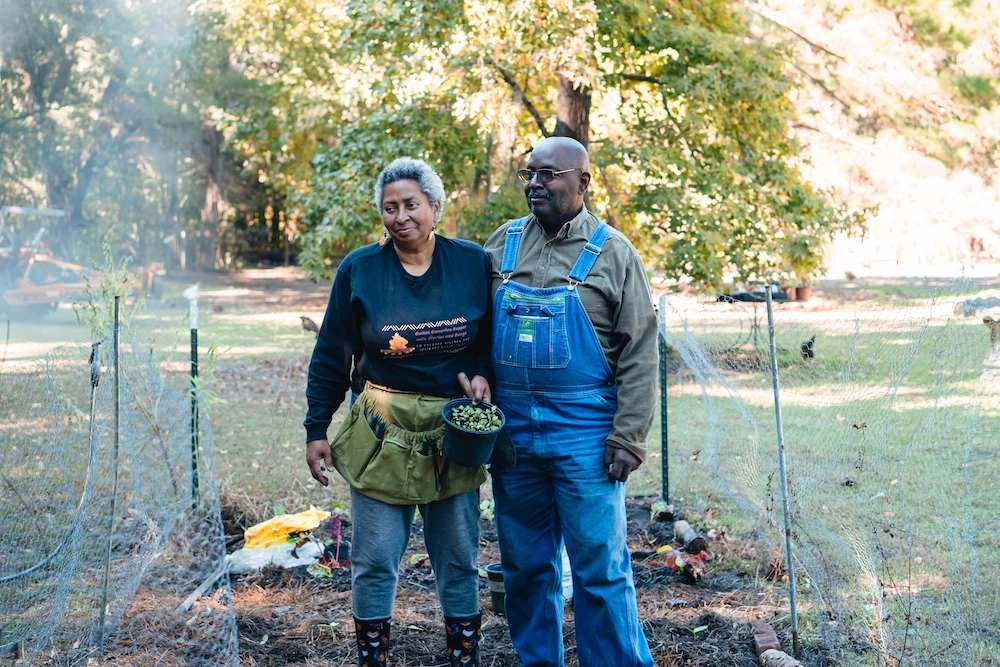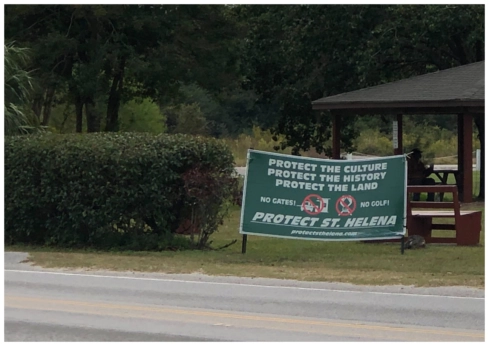The Jones family farm stands resolutely on an island facing Black land loss.

Just off the coast of South Carolina sits St. Helena Island, a 64-square-mile stretch of moss-lined oaks and sandy roads surrounded by marshland. Black farmers have spent decades caring for the land on this island; the Gullah people who live here are the descendants of formerly enslaved people from West and Central Africa who worked in the region’s rice and indigo plantations. But encroaching development threatens to upend the island’s identity as an agriculturally minded working-class community.
The past few decades have brought changes to Gullah-Geechee communities in the Lowcountry, as ancestral land and farms have been turned into private, gated communities with golf courses as a playground for the wealthy, accompanied by higher taxes. But farming is still a big part of St. Helena’s industry, with both large farms and family operations, such as the Marshview Community Organic Farm, still in operation.
In many cases, land has been passed down between generations, including the acreage of Tony and Belinda Jones, owners of Morning Glory Homestead Farm. It’s one of the handful remaining on an island that was once full of Black-owned farms.
A shared journey to farming
Both with Gullah ancestry, Tony and Belinda met while attending South Carolina State University. They reunited at a friend’s wedding after Tony joined the military.
“We were engaged in 1985. In April, we were married. It was the Anthony and Belinda Show,” she says. “From that point on, I was on the road. We were from one duty station to the next, and we have five children.”
Tony’s job brought them to bases all over the world, including stints in Germany and Belgium. Belinda noticed that, at each place they were stationed, there was some sort of farming operation, whether a small herb garden or raised beds. She set up her own gardens to teach their kids about farming.
“We found it very interesting that both [Tony and I] grew up with similar experiences in that our families had gardens and his grandparents had chickens and occasionally had hogs and so did mine,” she says. “I grew up helping my grandparents after school, when I was in first through eighth grade, feeding their chickens, helping with planting in their gardens, harvesting and collecting fruits from their fruit nut trees. They had pecans, black walnut trees, pomegranates, big trees, hard pears.”
The family moved back to the United States when Tony’s father’s health was failing. The Joneses started looking for land after his retirement, but one plot kept coming up on St. Helena Island.
The 12-acre parcel was originally purchased by a formerly enslaved man in 1868 and passed down through the members of Tony’s family for generations. “His father bought it from another family member in 1968 when that person no longer wanted to be responsible for the upkeep of the property and paying the taxes and everything,” says Belinda. “But they wanted to make sure it stayed in the family.” It had been rented out to other farmers over the years but hadn’t been actively used for some time, instead doubling as a community softball field for the Seaside Sliders.
“We’ve known it’s been in his family for a long time,” says Belinda. “I guess it was more like a family investment, like, ‘Here’s something for you to consider and for your future,’ which was a wonderful thought.”
A family affair
Tony planned his retirement from the military in 2002 and his parents gifted him the family land. Unlike many of the farms on the island, Morning Glory is individually owned by the Joneses, not an “heirs’ property,” a term applied to land shared by heirs of the original owner, usually within the Gullah community and who often don’t have documents such as wills and titles.
The Jones family cleared land and built a house, wired by Tony’s uncle. They started a small garden for the kids, who were getting involved with the 4H program, following the precision taught to Belinda by her grandfather, a brick mason.
The farm started out with chickens, selling eggs at the local farmers market. The operation has since expanded to include lettuce, okra and collards, plus pigs, goats, turkeys and ducks. The Jones farm follows traditional Gullah agricultural traditions during the island’s long growing season including permaculture, crop rotation and minimal tilling. (Although the Joneses don’t have cows, the Gullah-Geechee are also considered to be originators of free-range cattle, adapting to the landscape in a way that European methods didn’t.)
“At first, we were just doing this to feed the kids, everybody and teach them some great skills that they can always use if they have the inclination to do it later,” says Belinda. “They’re all grown now, but every now and then, they’ll put a seed or two in the ground or a container or something. And when they come back, well, they’re always interested in what we’re doing.”
And it’s not just the Jones children that connect with the farm. Morning Glory Homestead also offers tours for school groups that bring students up close to the farm’s plants and animals. Family camp weekends allow visitors to stay on the island and learn about notable Black agriculturalists such as George Washington Carver.
No gates, no golf
Black land loss is sadly nothing new, especially in the Gullah-Geechee communities. Hilton Head Island serves as a cautionary tale: Previously home to a large Gullah population, it is now a mostly white resort town. Officials in coastal Georgia voted for rezoning to allow an increase in home size on Sapelo Island, which residents of the Hogg Hummock community fear will attract the wealthy and force them out. And on neighboring Bay Point Island, a 2020 plan proposed an eco-resort among the unspoiled acreage, which was recently denied. It would have covered an area called Land’s End, surrounded by small farms, which was the site of a Civil War fortification that’s an important part of local history as it’s where enslaved people were freed, well before the passage of the Thirteenth Amendment.
“There was a battle there called the Battle of Port Royal, where the Union Navy came up and attacked both of those facing forts and won.The Confederates left, and the Blacks call it the day of the ‘big gun shoot.’ The military term for the newspapers called it the ‘Great Skedaddle.’ So, all of the plantation owners left because now they were under Union occupation,” says Belinda.
Attention is now turning to St. Helena, where signs around town say “No Gates, No Golf” in response to plans for a 500-acre resort. Farms are being lost to outside developers and economic hardship, especially due to these heirs’ properties.

A sign protesting development in St. Helena. (Photo: Caroline Eubanks)
“The battle over that is still going on. There are already, within the St. Helena zip code, five golf courses, and two of them are directly on St. Helena; two are on Fripp [Island],” says Belinda. “Then, within Beaufort County, there are over 30 golf courses. So, why do we need one more?”
Family-run farms such as Morning Glory are an important way to protect the Gullah culture of St. Helena Island. Groups such as the Pan-African Family Empowerment and Land Preservation Network, the Center for Heirs’ Property Preservation and the Penn Center’s Land Use and Environmental Education program are providing residents with much-needed assistance such as business workshops and legal services.
For Belinda and Tony Jones, it’s not just about land ownership. They consider themselves stewards of this piece of St. Helena and want it to continue for generations as it is.
“Don’t just kill that land out there just so people can come play on the back nine,” says Belinda.


I hope and pray that they are able to keep their land . Where and when do the greed stop with these folks . They act as if they are going to be able to take their wealth and all of this land to the grace not so .
Hopefully young people will develop an interest in farming and restoring Geechee Gullah tradition against the encroachment and gentrification taking place in the low country and everywhere actually.